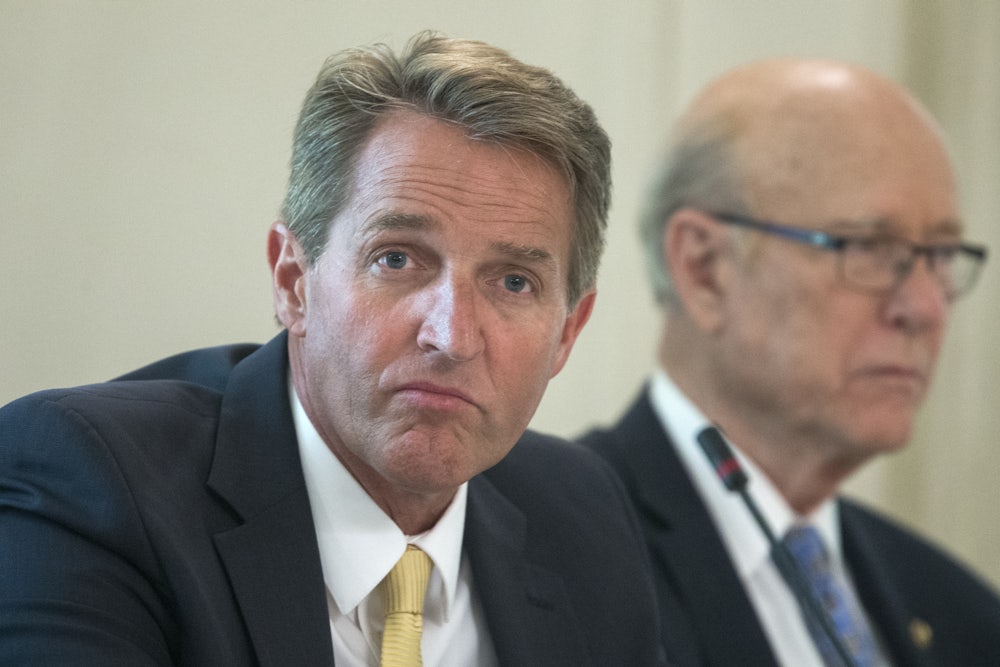In a Politico op-ed late last month, Jeff Flake, the pseudo-apostate Republican senator from Arizona, warned that his party was in “denial” about President Donald Trump. Conservatives, he wrote, “have maintained an unnerving silence as instability has ensued,” adding that this “unnerving silence in the face of an erratic executive branch is an abdication, and those in positions of leadership bear particular responsibility.” The press ate it up. “Flake makes waves with Trump takedown,” Politico declared days later. The Los Angeles Times called him the “one Republican willing to take on President Trump and his party’s ‘denial.’”
It is very unlikely that Flake particularly cares about winning plaudits from the establishment press or the left—not when his political career depends first and foremost on winning the GOP nomination in his own reelection campaign next year. But his reemergence as a vocal Trump critic, amid the collapse of his party’s legislative agenda, points to an awareness on his part that the president will be a drag on him and other similarly situated Republicans in general elections outside of throbbing-red Trump country.
There is nothing novel about down-ballot politicians attempting to distance themselves from their parties’ standard bearers, especially with hollow criticism. What makes Flake’s rendition unique is the irreducible nature of his criticisms. He isn’t calling out Trump for milquetoast sins like losing touch with the working class, or setting his legislative priorities in the wrong order. His recent broadsides against the administration more closely resemble establishment conservative efforts to expel Trump from Republican politics during the presidential primary than it does typical party frustrations with an unpopular president.
Considering Flake’s near-complete unwillingness to save himself or his party from what he describes as a serious threat, his half-hearted rebellion is a microcosm of the crisis that awaits Republicans if the Trump presidency collapses terminally. They won’t be left asking themselves, as Democrats are today, where they and the party went wrong, but explaining why they made a Faustian bargain with a known villain at unacceptable cost for the rest of us.
Flake’s recent trip off the reservation is doubly coincidental, timed as it is for the release of his new book, Conscience of a Conservative. But it is very hard to imagine Flake going about this rebranding exercise if Trump had been a capable steward of the GOP agenda or had managed to conduct himself less dishonorably–and thus enjoyed favorability numbers higher than the mid-30s.
But Trump has debased everyone who’s tolerated his corruption, indecency and ineptitude even briefly—such that they can’t really attempt to draw a contrast without looking ridiculous.
“I wish that we as a party would have stood up, for example, when the birtherism thing was going on,” Flake lamented on Meet the Press this past Sunday. “A lot of people did stand up, but not enough. That was particularly ugly.”
Sen. @jeffflake (R-Ariz.) tells @chucktodd in an exclusive interview, "I wish we as a party had stood up" to the birther movement. #MTP pic.twitter.com/LfIABvICFj
— Meet the Press (@MeetThePress) August 6, 2017
When host Chuck Todd asked Flake if he’d done enough to stop the scourge of that particular racist conspiracy theory, Flake calibrated his answer as an implicit confession that he hadn’t been a perfect role model, but had at least taken a hard line against the birthers.
“On that I think I did.”
An amusingly cursory review of the record underscores just how deep the Republican Party’s complicity with the ugliest aspects of Trumpism actually runs.
Just last month, Flake voted along with every single Senate Republican to confirm John Bush, a man who published birther screeds online, as a federal judge. On Monday, the Republican National Committee announced it had hired the pro-Trump apparatchik Kayleigh McEnany, who also flirted with birtherism, as a party spokesperson. Flake has not objected.
The limits of Flake’s complaints were similarly apparent last year. During the presidential race, he persisted in criticizing Trump even after Trump won the party’s nomination, and claimed to be considering a third-party vote.
America deserves far better than @realDonaldTrump
— Jeff Flake (@JeffFlake) October 7, 2016
Flake never revealed how he voted. And he also never told the country Trump deserved to be defeated, or that Hillary Clinton would make a far better president than Trump, despite keen awareness that Trump was a racist whose victory, however unlikely, would be immensely destabilizing.
Flake now professes alarm about Trump’s “affection for strongmen and authoritarians,” yet has done next to nothing with his extraordinary power—including a seat on the Foreign Relations Committee—to stop Trump from presiding over a pro-authoritarian administration.
Only a handful of Republicans can boast of having taken meaningful action to contain Trump. That may be changing now that it’s too late. Nearly all of them convinced themselves to hope for the best if Trump won, without expecting or preparing for the worst. They made their peace with a president they, like Flake, knew wasn’t good enough for America, which leaves them enormously exposed if the very things they agreed to overlook destroy his presidency and plunge the country into bitter chaos.
